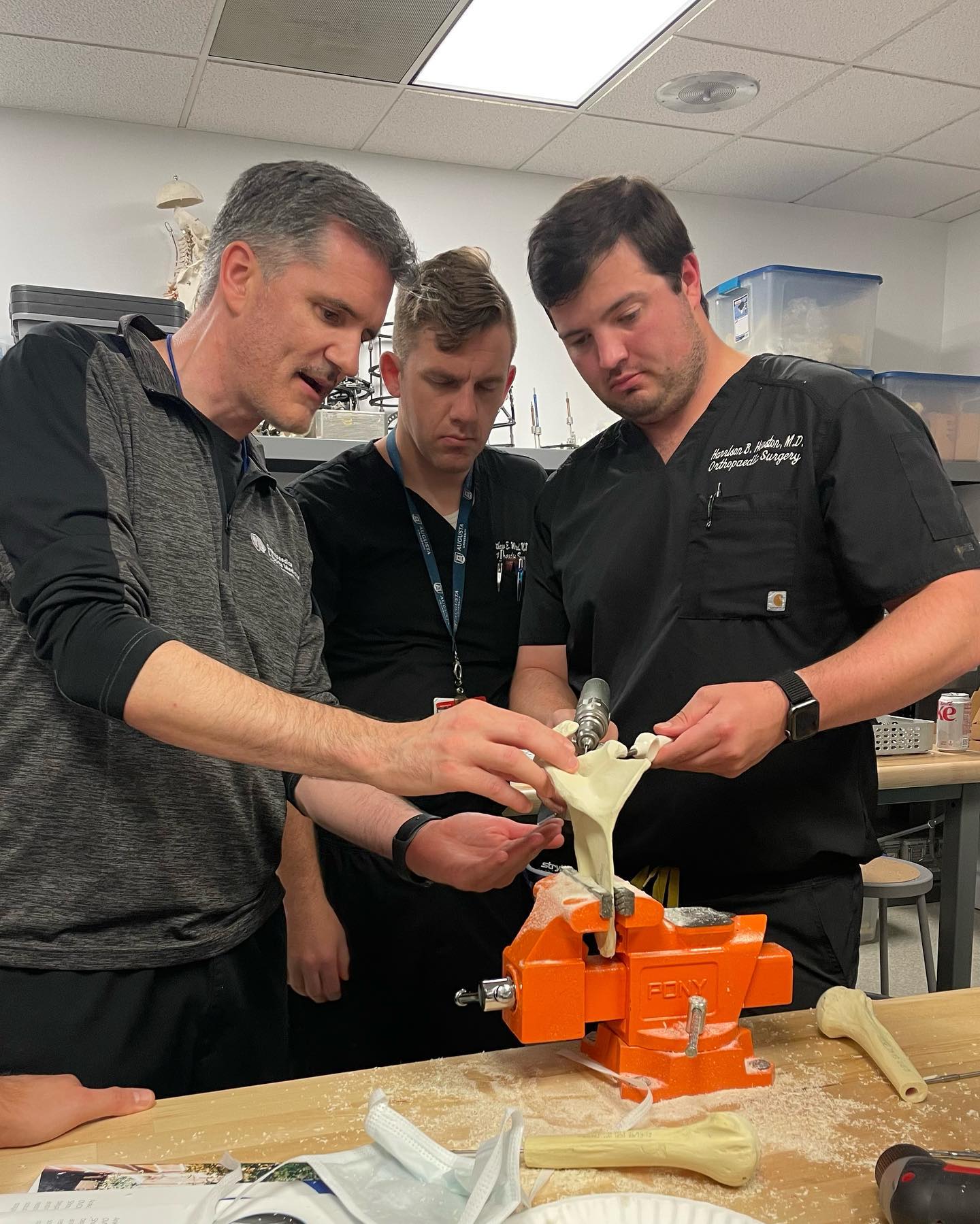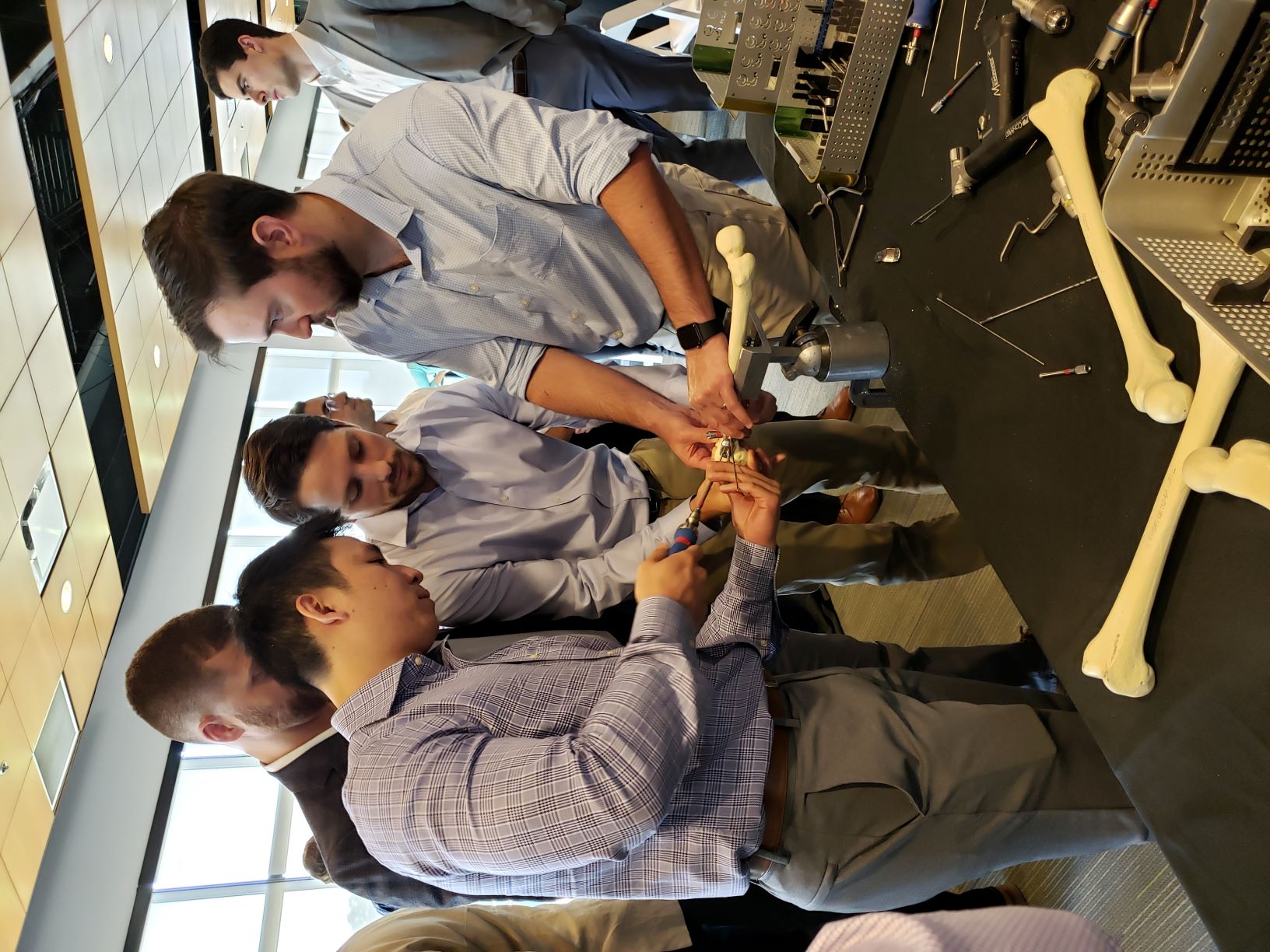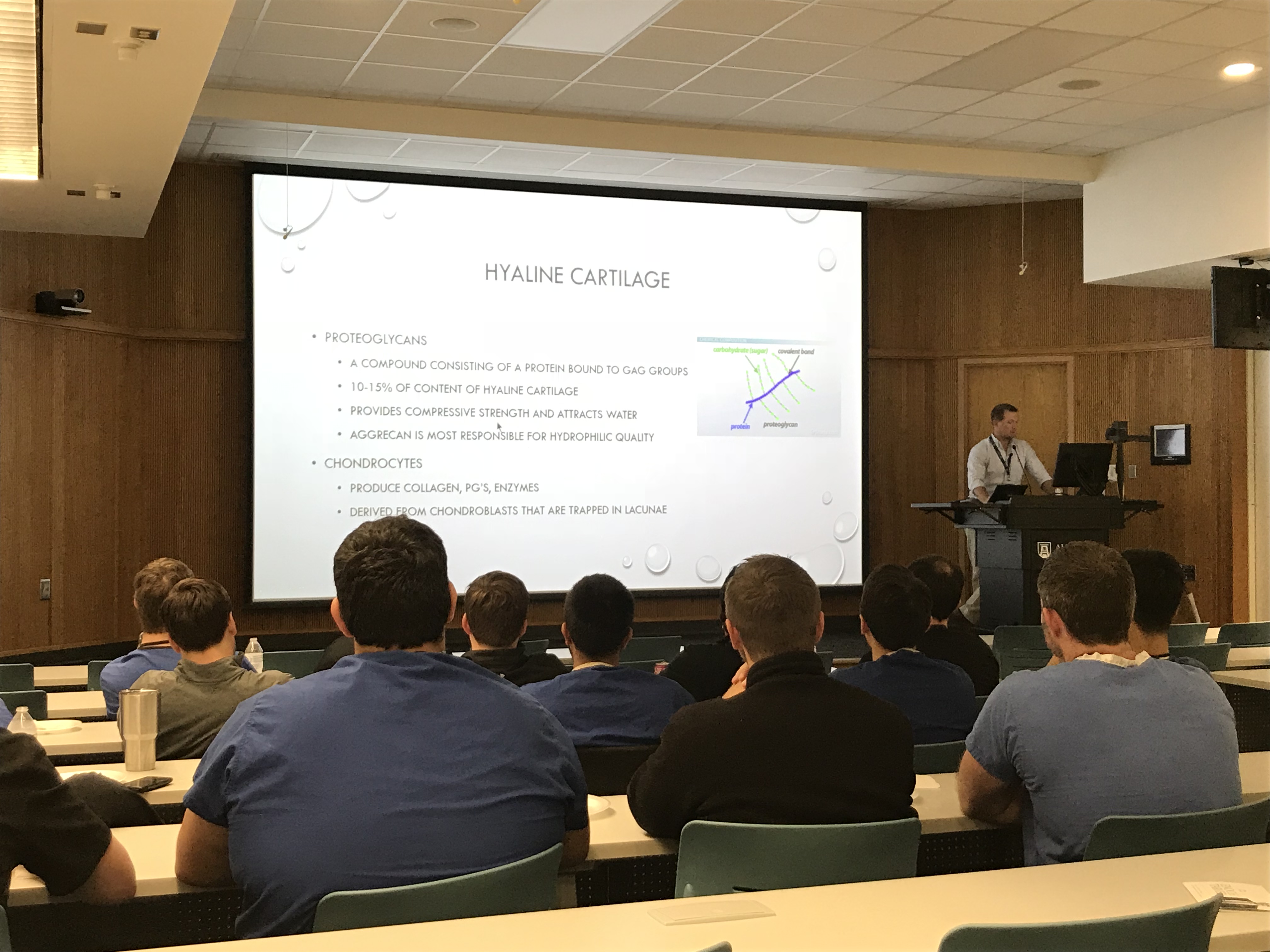Curriculum
The orthopaedic surgery residency program at the Medical College of Georgia at Augusta University provides a curriculum that prepares you for a successful career in orthopaedic surgery.
Our Approach
We prepare you for a career of lifelong learning by breaking the mold created by 20 years of formal education. We maximize training opportunities and foster continual growth through our approach:
 |
Hands-on learning:
Team approach: |
 |
Supervision
Our residents do not merely observe our faculty members, nor do they practice unsupervised. Our approach to supervision allows you to learn through doing while we maintain a high standard of clinical care.
Residents are closely involved in patient care in all settings:
Outpatient Care Setting
Residents see patients under the supervision of an attending physician, who is present in the clinic. Residents evaluate many of the patients first and formulate a diagnosis and treatment plan. Residents then present diagnoses and treatment plans to the attending physician, allowing for immediate feedback and relevant learning opportunities.
Inpatient Care Setting
Residents are involved in all aspects of inpatient care. Residents will:
- Make daily rounds with the faculty team
- Evaluate inpatient consultations
- Formulate surgical treatment plans for each patient, which they will discuss with the attending physician before proceeding to the operating room
- Participate in surgeries under the close supervision of an attending physician
- Coordinate postoperative care and follow up
Educational Conferences
During your residency, you will attend conferences and meetings that take place on a given frequency.
Morning Conferences
Morning conferences take place each weekday and include:
Morning Report
6:30 a.m. Monday through Friday
The junior resident on call presents all after-hours orthopaedic consultations to medical students, residents and faculty. Monday's conference covers all cases seen during the weekend, and Tuesday through Friday's conferences cover all cases seen during the previous night.
Curriculum Conference
Tuesday through Friday immediately following morning report
This conference acts as the foundational didactic preparation for our residents before they take the Orthopaedic In-Training Exam (OITE) and American Board of Orthopaedic Surgery Part I Examination. This conference takes place as an interactive lesson or a didactic presentation. It is organized in a two-year rotating curriculum that covers all orthopaedic subspecialties, as well as basic science.
The curriculum conference also includes:
- A series of “boot camp lectures” in the beginning of each year to review critical information on emergency management of common orthopaedic consultations
- An orthopaedic in-training examination review each fall
- A gross anatomy session every other year to provide a hands-on review of anatomic relationships and surgical approaches
Resident Meeting with Chair & Program Director
First Thursday of each month immediately following morning report
During this closed meeting, we solicit feedback from residents in an open-discussion format. This feedback is extremely valuable to us, as we are constantly working to improve the residency program.
Morbidity & Mortality Conference
Fourth Thursday of each month immediately following morning report
Residents present cases to faculty and fellow residents for discussion, focusing on opportunities for quality improvement.
Research Committee Meeting
All residents and faculty attend a monthly research committee meeting. During this meeting, we review all ongoing research and new project proposals. The committee:
- Offers feedback on study design
- Provides assistance with addressing barriers to completing projects
- Ensures participants are making steady progress
- Celebrates successful completion of projects
Case Presentations
Third Thursday of each month immediately following morning report
A faculty member or designated resident presents challenging cases to medical students, residents and faculty. The conference’s open-discussion format is intended to spark lively and educational debate.
Afternoon Conferences
On two Wednesdays each month, we gather for protected educational time. Afternoon conferences include:
Grand Rounds
5 to 6 p.m. first Wednesday of each month
Distinguished speakers deliver presentations to medical students, residents, faculty and community physicians.
Journal Club
6:30 to 8:30 p.m. second Wednesday of each month
At this dinner meeting, residents, faculty and community orthopaedic surgeons discuss current and clinically relevant published research. Each subspecialty team chooses and electronically distributes articles for review before the meeting. This conference challenges the attendees to think critically and teaches evidence-based learning skills.
Annual Symposia
During your residency, you will attend annual academic conferences hosted by our department:
MCG Sports Medicine and Shoulder Conference
Each November, we invite a renowned sports medicine surgeon to the Augusta GreenJackets Stadium for an interactive conference on hot topics in sports medicine and shoulder surgery. We invite orthopaedic surgery faculty and residents from Eisenhower Army Medical Center and Palmetto Heath–University of South Carolina Medical Group as well as community orthopaedic surgeons and alumni.
Frank H. Stelling Pediatric Orthopaedic Conference
Every fall, a visiting distinguished pediatric orthopaedic surgeon leads interactive sessions of didactic lectures and case presentations. These lectures and case presentations cover important topics within the field of pediatric orthopaedics. We invite orthopaedic surgery residents and faculty from Augusta University and Eisenhower Army Medical Center, as well as community pediatricians and orthopaedic surgeons.
Spine Symposium
Each spring, we invite a nationally recognized spine surgeon to present on important topics within the field of spine surgery. The symposium involves didactic lectures from the invited speaker and local spine surgeons as well as interactive case presentations by the residents.
We invite orthopaedic surgery faculty from Augusta University Eisenhower Army Medical Center and Palmetto Heath–University of South Carolina Medical Group. We also invite Augusta University neurosurgery residents and faculty, community orthopaedic surgeons and alumni.
Resident Research Day
Each spring, a prominent orthopaedic clinician-scientist is invited to present their research interests and accomplishments. They also offer advice on how to balance clinical and research responsibilities.
Chief residents present a summary of their research accomplishments for consideration for the Monroe Levine Resident Research Award. We present this award at the end-of-year graduation ceremony. PGY-3 residents also present a project, allowing them to receive feedback and suggestions for improvement.
Elwyn Saunders Academic Graduation Symposium
Each year in June, we invite a visiting professor or distinguished alumnus to lead the academic portion of our graduation celebration. The format typically consists of several lectures delivered by the speaker and interactive case presentations by the residents.
National Resident Courses
We offer financial support to residents so they can attend national courses:
- American Academy of Orthopaedic Surgeons Annual Meeting: PGY-5 residents attend.
- Association for Osteosynthesis/Association for the Study of Internal Fixation (AO/ASIF) Basic Trauma: PGY-1 or PGY-2 residents attend before their trauma rotation.
- AO/ASIF Spine: PGY-3 residents attend.
- Miller Board Review Course: PGY-5 residents attend.
Questions About Our Orthopaedic Residency Program Curriculum?
To speak with a representative from our orthopaedic surgery residency program, please contact our program coordinator.
Contact Us
Residency | Orthopaedic Surgery
Shannon Williford
706-721-1633